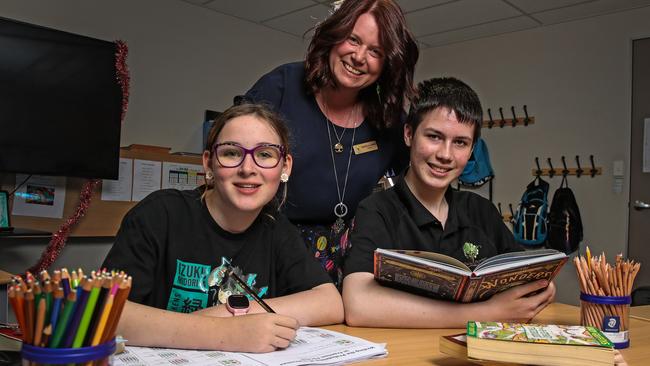Independent special schools for disengaged students double in five years
The demand for special schools aiming to get disengaged students back on track is intensifying, with some students sitting on waiting lists having not regularly been to school for years.
Schools Hub
Don't miss out on the headlines from Schools Hub. Followed categories will be added to My News.
Special assistance schools for disengaged students are booming in the independent sector with enrolments growing 30 per cent in the past year.
Ohana College in Brisbane’s outer south opened in 2018.
Principal Tenneille Lynham said there had been substantial growth in enrolments and there was a waiting list.
“When I started here four years ago we had 35-40 kids in Years 7-9. Now we have 93 students in Years 7-12,” she said.
“Next year we will move our campus to Griffith University at Meadowbrook and we’re expected to grow to 140 students.”
The college charges $250 per student per term. Most funding comes from the state and federal government, which is the case for most independent special assistance schools.

Ms Lynham said many students were working below their year level.
“We’ve got a number of students who have had no formal education for a number of years,” she said.
“This can be due to bullying, domestic violence, anger issues, or disability.
“We look at whether our students have eaten, slept, or had family conflicts.
“We do welfare checks with students when they arrive, provide three meals a day, and have psychologists.”
Independent Schools Queensland chief executive Chris Mountford said special assistance schools are the fastest growing type in the independent sector, with the number of school sites and students more than doubling in the past five years.
“The number of students enrolled in the 28 independent special assistance schools has risen to 3900 students in 2022, representing a 31 per cent increase in student enrolments compared to the previous year,” he said.
In the Catholic sector, flexi schools specialise in disengaged students.
Enrolments have increased from 1935 in 2018, to 2340 in 2022 – more than 20 per cent growth.
Queensland Catholic Education Commission executive director Dr Lee-Anne Perry said there are 18 flexi school campuses across metropolitan and regional Queensland.
“Flexi schools provide the opportunity for these students to learn in inclusive and supportive environments that cater to their unique needs and keep them engaged,” she said.
A Department of Education spokeswoman said the equivalent in the state system is positive learning centres, but could not provide specifics on growth.
“There are 15 positive learning centres across Queensland that provide an alternative
program option for some students of compulsory school age who are enrolled in a state
school, and require temporary intervention beyond the capacity of a mainstream classroom,” the spokeswoman said.
“Students remain enrolled in their mainstream school, and as such data is maintained within
the student’s school record, and is not held centrally.”




